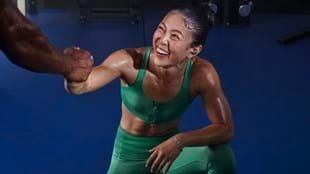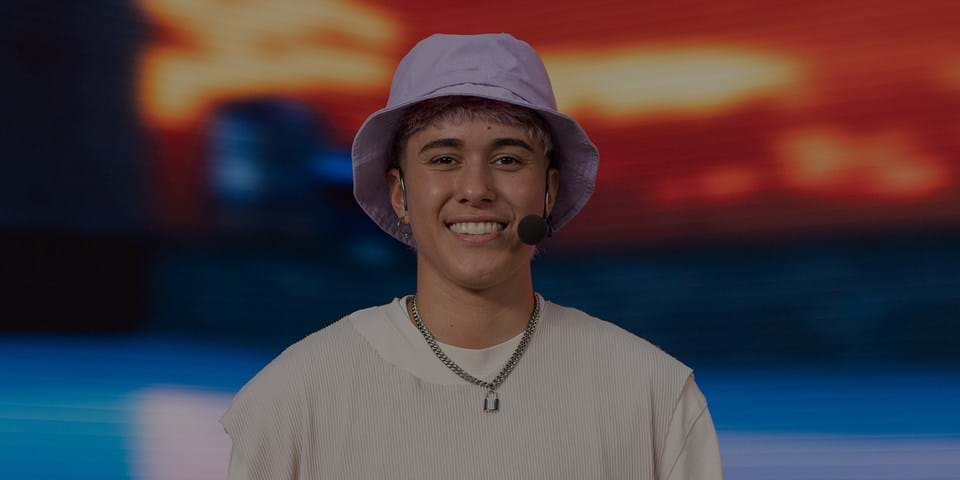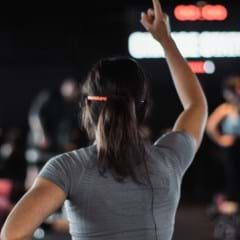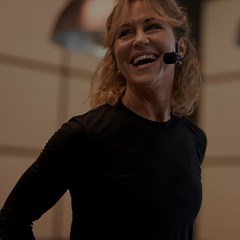Hi Amy! Can you share a little of your background with us?
Amy Lu (AL): I came to New Zealand from China with my mum when I was five. It was just me and her. I had a very classic immigrant Chinese upbringing – there's a certain image and trajectory of your life that parents envisage for you. If you're a girl, you're expected to be nice and calm and graceful and elegant and feminine. You meet a nice boy, you get married, have children, all that stuff. I remember always trying to fit into the mold that my mom had for me. Thinking back, I suspect her biggest fear was that I would be gay. I was into hip hop so she pushed me into ballet. I wanted to learn guitar, but that was too "boyish" so she pushed me into playing the flute. Even my name was very feminine in terms of the Chinese characters!
Growing up in New Zealand, gay culture wasn't as open as it is now. I never really explored my sexuality that much. I kind of knew I should like boys, but I was never sure I did. And I guess I had some internal kind of homophobia around myself as well. I had a couple of secret relationship with girls in high school and university.
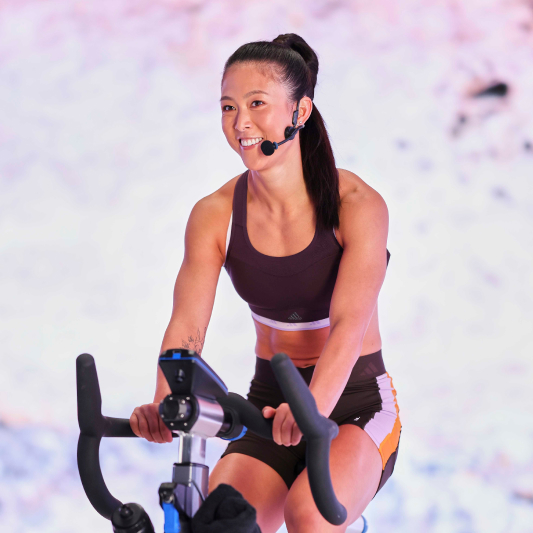
How did you get into teaching?
AL: After I graduated from medical school, I moved to Whangarei, which allowed me to re-introduce myself to the world. I joined the local community gym and they invited me to become an Instructor. They sent me along to Initial Training and that's where I met Carrie Kepple, who was one of the Trainers. If you know Carrie, you'll know she's petite, feminine and quite the pocket rocket! You'd never think she's gay! I vividly remember when she introduced herself and said: “I'm from America, but, you know, my wife's from New Zealand, so I'm going to be here forever.” I was only half paying attention, but when she said that I was stunned. I thought: “How could you just announce that so casually and so easily to so many people?” I'd been in a secret relationship for a few years, so that was like, what the hell?! It blew my mind!
After module, I began teaching at Les Mills clubs in Auckland. That first six months felt like a whole new world. At Les Mills, everyone was just so free. Everyone was so themselves. There was a very strong LGBTTQIA+ culture. And the thing is when you’re not "out", you always feel like you're putting on a facade. You're always self-conscious about everything you do and question yourself constantly: “Could this thing I said make this person think I'm gay?"; "If I do this, are they going to think I'm gay?". For the first time in my life, I felt accepted and encouraged to live my truth. And that gave me the courage, I suppose, to come out to my mom.
And that was difficult. I tried two or three times. The first time it didn't really go down very well. She just responded with the typical: “Do you need to go to church? Do you need a therapist? What have I done wrong?” That sort of stuff. It was honestly the ultimate rejection. There would have been a handful of times I tried to share myself with my mom, but if it didn’t fit her idea of who she wanted me to be, she didn’t want to hear it. My sexuality was an important part of my identity, so I tried to tell her again and I was convinced she would love me unconditionally and finally be okay with it. Unfortunately, she wasn't. Eventually we stopped talking about it and it was swept under the rug. We kind of just stopped speaking in general.
We started talking again when she got diagnosed with cancer. Up until that point, the toughest thing that had ever happened to me was not being supported by her in my sexuality. The cancer diagnosis easily trumped this. Being in the medical profession, I knew the trajectory of her illness, which was kind of useful, but at the same time not. We were forced to have a relationship again. But we never talked about or reconciled my coming out. She passed away a year and a half after her diagnosis. And hands down, that was the most excruciating thing I've had to navigate in my life. For the past few years, I've really struggled with grief. I don't have any other family around. It's just me.
If it wasn't for group fitness, I'm really not sure I’d feel as content with myself as I do now. I don't think I would have ever felt free to express myself, to be who I've always thought I wanted to be. I love the person I am now. I love the person I am when I teach.
That must have been very challenging. How did you cope?
AL: It was a lot. I was 26 when my mom got diagnosed. 28 when she died. I didn't have any adult figures around to show me how to process grief. I don’t have siblings to share the load with. And, you know, while my friends have been super supportive, I don't think they completely get it. Losing a parent is one of those things you just don't know until you know. Had you asked me about this a year ago, I probably would have put on a front and told you everything was great. But it was honestly a dark period in my life, and I’m only just starting to come out of it now.
I give a lot of credit to Les Mills for getting me through that time. It gave me routine because I had classes I had to be at each week, which reminded me I still I had a purpose in life. One of the best things about teaching is the people you meet, the community. Most of the friends that have supported me through the past few years were from Les Mills. I'll always be thankful that these same people have been the ones that have encouraged me to be myself. I guess you could say this is my "chosen family". If it wasn't for group fitness, I'm really not sure I’d feel as content with myself as I do now. I don't think I would have ever felt free to express myself and to be who I've always wanted to be. I love the person I am now. I love the person I am when I teach. That's the version of myself that I love the most. And I really do believe teaching makes a difference, it gives you that platform to help others. People struggle with all sorts of things behind closed doors. And all people really want to do is be able to express themselves freely.
People are often more impressed by my work as a doctor, but I'm honestly most proud of the work we do at Les Mills. We do A LOT of good in the world.
You're part of the NZ TAP Team and now regularly present on Masterclass. What tips do you have for others wishing to emulate your success?
AL: Be patient. Progress takes time. People don't just magically show up on Masterclass and be amazing. Most of the people you see have been working on their skills for eight, nine, ten years and are still learning! It takes time.
My approach would be: work on something. Work on it for a while until you feel as though you’re getting somewhere. Then look for ways to keep developing. Find a mentor. Send a video off to get your Les Mills Qualification. Reach out to your local TAP for feedback. You can't see what you can't see, so it helps to get an outside perspective. Then just chip away at it, one thing at a time.
If opportunities come along to upskill, be the first person to put your hand up. If you get invited to apply for TAP or whatever opportunity, apply. Sometimes our own ego, fear of rejection, wanting to be "perfect" or whatever doubts or insecurities we may have hold us back. But if you don’t put yourself out there and ask, it's automatically going to be a no. And hey, even if it is a no, that's fine. Maybe you're just not ready yet, but it doesn't mean you won't be in the future. Trust that your hard work will pay off and when the time is right, you'll be so good that people can't ignore you.
At the end of the day, the journey is the fun. You’ve got to love the journey! You grow as a person and whether you know it or not, you impact loads of people's lives along the way. A phrase I really like is “replace nervous with service”. When you're in that place where you're no longer super introspective, where you have laid strong foundations that you can back yourself on and you're in a position to give – that’s often the time when people start to get opportunities.
Who are your fitness role models, Les Mills or otherwise?
AL: I look up to people that have a strong work ethic because I think hard work beats talent any day. So I find people like Mat Fraser and Kobe Bryant massively inspirational. In terms of group fitness, my two idols are Glen and Gandalf.
In the initial part of my journey it was Glen, mostly because I wasn't always very confident, especially speaking in front of people. In a group setting, I used to just blend into the background and quietly observe. You know, Glen's not very flamboyant at all. He’s a quiet person. But even in his quiet he’s still confident, and he can control the room. And that’s something I really wanted to learn – how to make my quiet become louder. He also has an insane work ethic and sense of self-belief which I really wanted to emulate.
And then I love Gandalf! You know, he teaches a great class, creates experiences, is a great dancer, is captivating, super funny, creative, original, all of those things. But what I really, really, really admire about him is how original and free he is in himself. He's so out of the box! He's authentic and just does what he loves. I find that super inspiring. And because he's so unapologetically himself, he gives people in his class permission to do the same. When I think about the ultimate connector, that's Gandalf. That's how I hope I can make people feel in my classes.
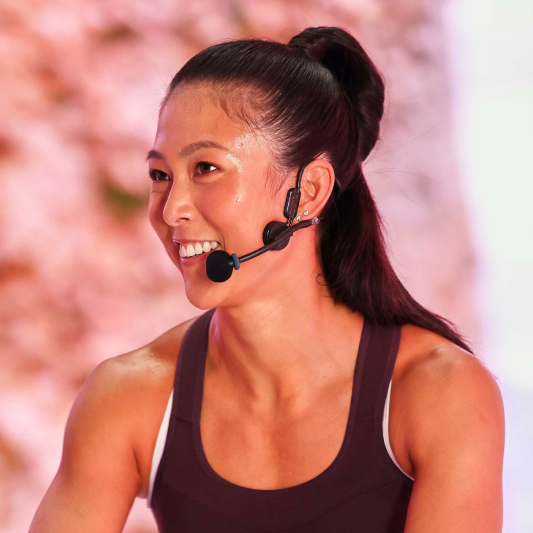
Your "other" job is as a doctor. How do your two roles complement each other?
AL: Group Fitness has made me an overall more developed person, especially in the emergency department setting where you're seeing people from all walks of life. It teaches you how to relate to people, how to talk to people. When you go to med school, especially if you've just gone through straight from high school, you’re in this bubble of studying for six years. When you come out the other end you've acquired this medical knowledge, but you lose some of your social skills. I see junior doctors coming into hospital in their early twenties who don't even really know how to relate or talk to people because all they've done is study. Teaching has also taught me more about myself as a person. We get wonderful opportunities like Advanced Training where we get to explore our why, our purpose in life, our values. We don't talk about that stuff in medicine at all.
Conversely, I think being a doctor gives me appreciation for what we do in group fitness. In hospital I feel as though I’m dealing with things at the bottom of the cliff. It’s not always satisfying because you’re not always sure if you’re making a difference in people's lives, or if you’re just a band aid. In group fitness, you’re giving people confidence. You’re giving people health. Class after class, you’re giving them the space and opportunity to a create a better version of themselves. You’re empowering them to make choices so they can be successful and their best self in their day-to-day life.
People are often more impressed by my work as a doctor, but honestly, I'm most proud of the work we do at Les Mills. We do A LOT of good in the world. We get people moving and keep them healthy. We make people feel accepted. We make people feel like they belong. We encourage them to be themselves. It's all stuff that people need to feel happy. It's an absolute privilege to be able to do this and teaching classes is what gives me my ultimate sense of purpose.



